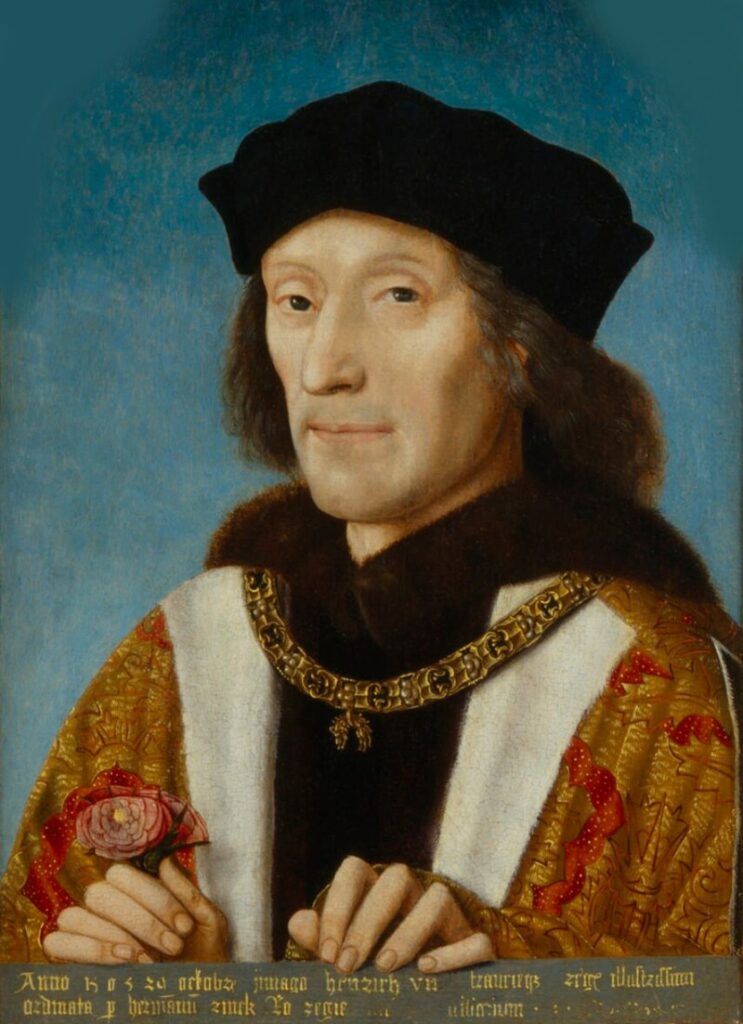Henry VII, the first monarch of the Tudor dynasty, is often remembered for his role in establishing the stability that England so desperately needed after years of civil war. His life is a fascinating tale of survival, determination, and political savvy. Here’s an overview of his background, early life, rise to power, reign, and significant achievements.

Early Life and Background
Born on 28 January 1457 at Pembroke Castle in Wales, Henry Tudor was the son of Edmund Tudor, Earl of Richmond, and Lady Margaret Beaufort, a descendant of King Edward III through an illegitimate but later legitimized line. His father died before Henry was born, and he was raised under the guardianship of his uncle Jasper Tudor, who supported the Lancastrian cause during the Wars of the Roses—a series of dynastic conflicts between the houses of Lancaster and York for the English throne.
Henry’s claim to the throne was tenuous at best. His connection to the Lancastrian line came through his mother, but this was via a contested lineage, so he spent much of his early life in exile in Brittany to avoid the Yorkist kings, especially during the reign of Edward IV.
The Road to the Throne
The turning point came after the death of King Edward IV and the subsequent usurpation of the throne by Edward’s brother, Richard III, in 1483. This created a power vacuum and led to increasing discontent, even among some Yorkists. Henry, still in exile, was seen by many as the most viable alternative to Richard III.
With the support of French and Scottish forces, Henry landed in Wales in 1485 and marched through the countryside gathering support. On 22 August 1485, he faced Richard III at the Battle of Bosworth Field, one of the most decisive battles in English history. Richard III was killed in battle, and Henry claimed the crown, marking the end of the Wars of the Roses.
Reign and Achievements
Henry VII’s reign (1485–1509) is often defined by his efforts to consolidate power and secure the throne for future generations.
Marriage and Union of the Houses: One of his first acts as king was to marry Elizabeth of York, the daughter of Edward IV. This marriage symbolically united the houses of York and Lancaster, putting an end to the dynastic wars and solidifying his position as king. The Tudor rose, a combination of the red rose of Lancaster and the white rose of York, became the emblem of this union.
Establishing Peace and Stability: Henry’s reign was focused on stabilizing the kingdom. To achieve this, he adopted a series of measures:
- Financial Reforms: Henry was known for his frugality and attention to royal finances. He significantly improved the crown’s fiscal health by carefully managing expenditures, increasing taxation, and restoring wealth to the monarchy, depleted during the Wars of the Roses.
- Centralization of Power: Henry strengthened royal control by reducing the power of the nobility, who had been a major cause of instability. He used methods such as bonds and recognizances to ensure noble loyalty and created a more centralized system of governance.
- Diplomatic Marriages: Henry also made strategic marriage alliances. His son Arthur married Catherine of Aragon, daughter of the Spanish monarchs Ferdinand and Isabella. After Arthur’s death, Henry arranged for his second son, Henry VIII, to marry Catherine, furthering ties with Spain.
Suppressing Rebellions: Despite his efforts, Henry’s reign wasn’t without challenges. He faced several pretenders to the throne, including Lambert Simnel and Perkin Warbeck, both of whom claimed to be legitimate Yorkist heirs. However, Henry’s intelligence network and strategic alliances helped him to suppress these threats and secure his reign.
Legacy: Henry VII’s greatest achievement was leaving the throne to his son Henry VIII in a strong and stable condition, something that had not been done peacefully for generations. His foundation of the Tudor dynasty set the stage for the monumental events of the 16th century, including the English Reformation and the expansion of English power.
Conclusion
Henry VII’s reign may not be as famous as that of his son or granddaughters, but his impact was profound. He restored order to a nation torn apart by civil war, ensured financial stability, and laid the groundwork for one of the most famous dynasties in English history. Through shrewd diplomacy, political maneuvering, and a series of reforms, he established the Tudor line that would rule England for over a century.
Henry VII died on 21 April 1509, leaving behind a legacy of peace and prosperity that allowed his successors to focus on the more dramatic events that defined the Tudor age.